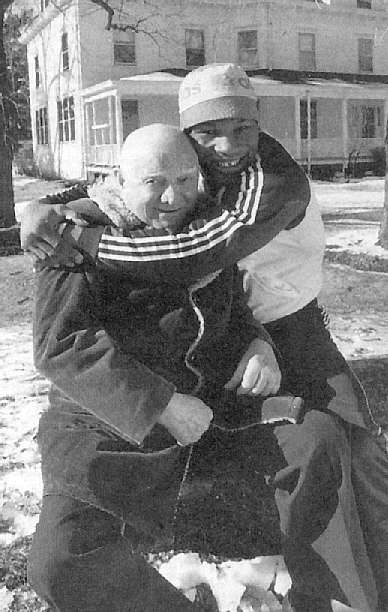
If any professional athlete has the gift of gab, it is Mike Tyson. Words have proven to be profoundly significant in his life, from the infamous interviews about his relationships with the women in his life, to cussing out/threatening opponents in press conferences, to his now rather candid reflections on his crazy life in documentaries and stage shows and now his new autobiography. Grantland‘s Jay Caspian Kang’s recent piece on Tyson’s life and career is an extremely thoughtful observation on the complexities which mark Iron Mike’s life. The article especially sheds light on Tyson’s relationship with his former trainer/guardian, Cus D’Amato. The video below tells a story about an old man and a young boy, and provides a glimpse into the grace in which their relationship was rooted. I realize it’s a little lengthy, but it’s so worth it! Tune in at the 3:06 and 4:48 marks in particular, and grab a tissue.
[youtube=http://www.youtube.com/watch?v=mVoM-Qsph6k&w=600]
Amazing! So profound were the usage of words in their relationship. Given his childhood to that point–Tyson was only 14 when he first met Cus, and a troubled 14 year old at that–being told “he’s going to be the heavyweight champion one day” was unfathomable to Tyson. And his response couldn’t have been more appropriate: giddily hugging the man who told him the good news only to utter, “No he didn’t! Did he really?!” Cus’ approach to training/caring for Tyson is best summarized by himself in the clip:
I’m not a creator. What I do is discover and uncover. And when I uncover, the boys discover qualities in themselves they didn’t even know they had.
 Indeed, Tyson has always described Cus as a father figure, and if you’ve ever seen other clips/interviews in which he speaks about his guardian, then you know that tears accompany his words. Perhaps it’s not a stretch to say that his relationship with Cus might be the only instance Tyson has ever experience acceptance and grace. Perhaps that’s why AA-like approaches to recovery are appealing for him as of late.
Indeed, Tyson has always described Cus as a father figure, and if you’ve ever seen other clips/interviews in which he speaks about his guardian, then you know that tears accompany his words. Perhaps it’s not a stretch to say that his relationship with Cus might be the only instance Tyson has ever experience acceptance and grace. Perhaps that’s why AA-like approaches to recovery are appealing for him as of late.
Language, and it’s power–both relationally and theologically–has been an area of interest to me, and not only because I was an English major in college. On the relational side of things, language has been quite a bit weightier than usual–my wife and I got married this past June. I remember sitting with her at our rehearsal dinner the night before our wedding day, listening to our closest friends toast and highlight various qualities that my wife and I “didn’t know we had”–it was powerful. We talk about that night just as much as our actual ceremony. And of course there’s the everyday, nitty-grittyness of marriage, a place in which words carry equal (if not more) weight. There are also words of vulnerability, affirmation, and disappointment. And then there are the words my wife and I hear every Sunday morning at corporate worship during the assurance of pardon, in which the Good News is announced.
I’ve lost count of how many times I’ve watched the video above over the past three days, as it encompasses so much of the beauty of language, particularly when it serves as the vehicle in which grace is extended. There’s simply no way I can end this article and not quote the master of words himself in the undeniably beautiful (and previously posted) Sonnet 116:
Let me not to the marriage of true minds
Admit impediments. Love is not love
Which alters when it alteration finds,
Or bends with the remover to remove:
O, no! it is an ever-fixed mark,
That looks on tempests and is never shaken;
It is the star to every wandering bark,
Whose worth’s unknown, although his height be taken.
Love’s not Time’s fool, though rosy lips and cheeks
Within his bending sickle’s compass come;
Love alters not with his brief hours and weeks,
But bears it out even to the edge of doom.
If this be error and upon me proved,
I never writ, nor no man ever loved.

COMMENTS
2 responses to “Mike Tyson and His Beloved Trainer”
Leave a Reply













I’ve found myself drawn to Tyson’s story as of late. I never really saw him in his prime, rather in his decline. His is a heart-wrenching story of redemption but perhaps even more so of the need for grace.
Tyson, speaking of having lots of money after starting to win, went back to his childhood area in Brooklyn and just starting giving thousands of dollars to people. One line that’s stuck with me:
As cliché as it sounds, my heart breaks for people with stories like this. I want so bad for them to know the love and acceptance they have for no other reason but for Christ’s finished work, but I’m just as guilty as trying to buy my way in…
Thanks for your comment, Damon. Especially for your honesty. I can relate: “I’m just as guilty as trying to buy my way in…”